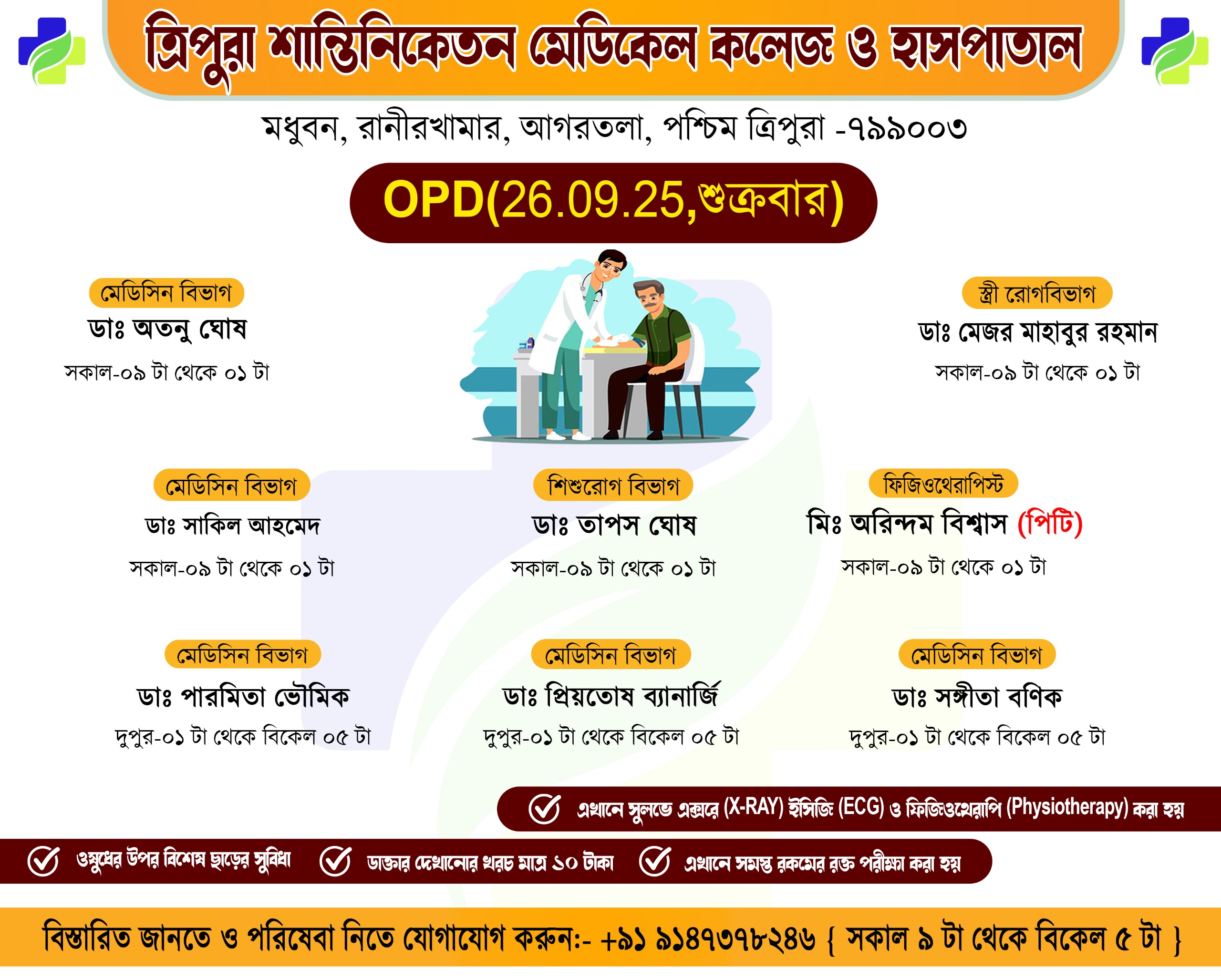Tripura Shantiniketan Medical College Redefines School Healthcare
- By Thetripurapost Desk, Agartala
- Sep 25, 2025
- 889
In the bustling debate around India’s education system—curriculum reforms, digital classrooms, exam stress—one silent, often overlooked factor continues to shape futures: health. Students carry not only the weight of textbooks but also the invisible burden of untreated illnesses. Against this backdrop, Shantiniketan Medical College’s initiative to conduct free health camps across schools emerges as more than a social gesture. It represents a profound rethinking of the role schools can play in a nation’s public health ecosystem.

A Classroom Beyond Textbooks
For decades, Indian schools have focused almost exclusively on academic instruction, relegating health to the margins. Periodic medical check-ups, when arranged, were more ceremonial than substantive. Shantiniketan’s program disrupts that inertia. By turning school corridors into temporary clinics, it underscores a radical yet simple idea: learning and health are inseparable.
Equity in Action
The initiative shines brightest when examined through the lens of health equity. Rural and semi-urban families often forgo regular medical consultations—distance, cost, and awareness being the usual barriers. The camps, offering everything from vision and dental checks to blood pressure and diabetes screening, democratize access. A child whose parents could never afford a private consultation suddenly finds a diagnosis—and possibly, a lifeline—within her school walls.

From Reactive to Preventive Healthcare
India’s healthcare model remains overwhelmingly reactive—rushing patients into hospitals when conditions are advanced. Shantiniketan’s school-based health drive illustrates the power of prevention over cure. Catching anemia in a 12-year-old, diagnosing vision impairment before it stunts learning, or flagging hypertension in overworked teachers—these are small interventions with vast ripple effects, both economic and human.
Schools as Social Health Laboratories
The genius of such camps is that they don’t stop at diagnosis; they double as awareness incubators. Students learn the importance of hygiene, balanced diets, and routine check-ups. Teachers, too, gain insights into managing stress and lifestyle disorders. Each participant becomes a node of awareness, carrying knowledge back to their families and communities. Thus, a school health camp morphs into a miniature public health campaign.

The Missing Links
Yet, to treat this as a panacea would be naïve. Health camps without follow-up systems risk degenerating into symbolic exercises. A child diagnosed with dental decay still needs treatment. A teacher flagged with hypertension requires consistent monitoring. The sustainability question looms large: Will Shantiniketan’s initiative remain a one-college wonder, or will it inspire systemic adoption?
Policy Crossroads
Analytically, this initiative dovetails with India’s National Health Policy (2017) and the Ayushman Bharat School Health Programme, which emphasize preventive, community-based healthcare. Medical colleges partnering with schools can enrich both sides—students gain medical attention, while trainee doctors acquire hands-on experience in community health. If scaled, such collaborations could help recalibrate India’s public health strategy.
Global Resonance
Globally, countries like Finland and Japan already integrate school-based healthcare into their welfare states, ensuring that every child is monitored, guided, and protected. Shantiniketan’s experiment nudges India closer to that vision, albeit through a locally driven, resource-conscious model.
Conclusion: A Blueprint for Tomorrow
Shantiniketan Medical College’s school health camps are more than episodic interventions—they are a provocation to rethink how India perceives education and healthcare. By collapsing the distance between the classroom and the clinic, the initiative sets a template for a future where schools aren’t just centers of literacy but hubs of holistic well-being.
The extraordinary lesson here is simple yet transformative: a healthy child learns better, a healthy teacher teaches better, and a healthy school builds a healthier nation.